Lesson Three(介绍)
- 格式:doc
- 大小:43.00 KB
- 文档页数:3
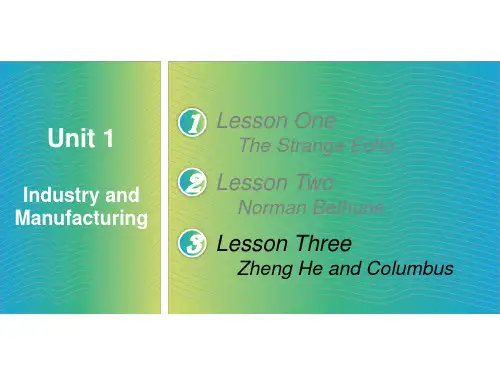
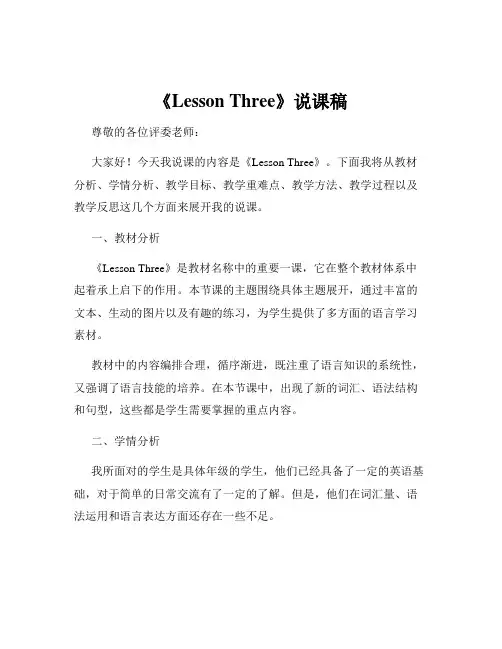
《Lesson Three》说课稿尊敬的各位评委老师:大家好!今天我说课的内容是《Lesson Three》。
下面我将从教材分析、学情分析、教学目标、教学重难点、教学方法、教学过程以及教学反思这几个方面来展开我的说课。
一、教材分析《Lesson Three》是教材名称中的重要一课,它在整个教材体系中起着承上启下的作用。
本节课的主题围绕具体主题展开,通过丰富的文本、生动的图片以及有趣的练习,为学生提供了多方面的语言学习素材。
教材中的内容编排合理,循序渐进,既注重了语言知识的系统性,又强调了语言技能的培养。
在本节课中,出现了新的词汇、语法结构和句型,这些都是学生需要掌握的重点内容。
二、学情分析我所面对的学生是具体年级的学生,他们已经具备了一定的英语基础,对于简单的日常交流有了一定的了解。
但是,他们在词汇量、语法运用和语言表达方面还存在一些不足。
在学习风格上,这个年龄段的学生活泼好动,好奇心强,喜欢通过多样化的活动和互动来学习。
因此,在教学过程中,我会设计丰富多样的教学活动,以激发学生的学习兴趣,提高他们的学习积极性。
三、教学目标基于对教材和学情的分析,我制定了以下教学目标:1、知识目标学生能够正确认读和理解本节课的新词汇,如列举新词汇。
学生能够掌握本节课的重点语法结构,如列举语法结构,并能正确运用在句子中。
学生能够熟练运用本节课的重点句型,如列举句型进行交流。
2、技能目标能够听懂与本节课主题相关的简单对话和短文。
能够用所学的语言知识进行简单的口头表达和书面表达。
3、情感目标培养学生学习英语的兴趣和积极性,增强自信心。
培养学生的合作精神和团队意识,提高跨文化交际的意识。
四、教学重难点1、教学重点新词汇的发音、拼写和用法。
重点语法结构的理解和运用。
重点句型的熟练掌握和运用。
2、教学难点如何引导学生将所学的语言知识运用到实际情境中,进行有效的交流。
对于一些语法点的理解和掌握,如具体语法难点,需要通过多种方式进行讲解和练习,帮助学生突破难点。
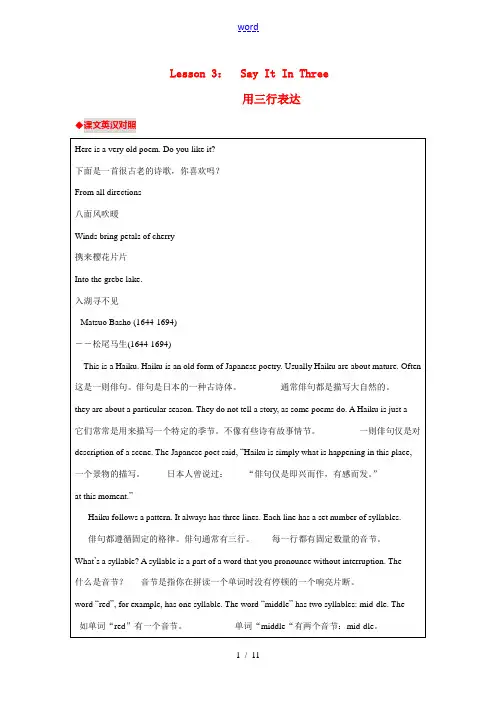
Lesson 3: Say It In Three用三行表达◆课文英汉对照Here is a very old poem. Do you like it?下面是一首很古老的诗歌,你喜欢吗?From all directions八面风吹暖Winds bring petals of cherry携来樱花片片Into the grebe lake.入湖寻不见--Matsuo Basho (1644-1694)――松尾马生(1644-1694)This is a Haiku. Haiku is an old form of Japanese poetry. Usually Haiku are about mature. Often 这是一则俳句。
俳句是日本的一种古诗体。
通常俳句都是描写大自然的。
they are about a particular season. They do not tell a story, as some poems do. A Haiku is just a它们常常是用来描写一个特定的季节。
不像有些诗有故事情节。
一则俳句仅是对description of a scene. The Japanese poet said, “Haiku is simply what is happening in this place, 一个景物的描写。
日本人曾说过:“俳句仅是即兴而作,有感而发。
”at this moment.”Haiku follows a pattern. It always has three lines. Each line has a set number of syllables.俳句都遵循固定的格律。
俳句通常有三行。
每一行都有固定数量的音节。
What’s a syllable? A syllable is a part of a word that you pronounce without interruption. The什么是音节?音节是指你在拼读一个单词时没有停顿的一个响亮片断。
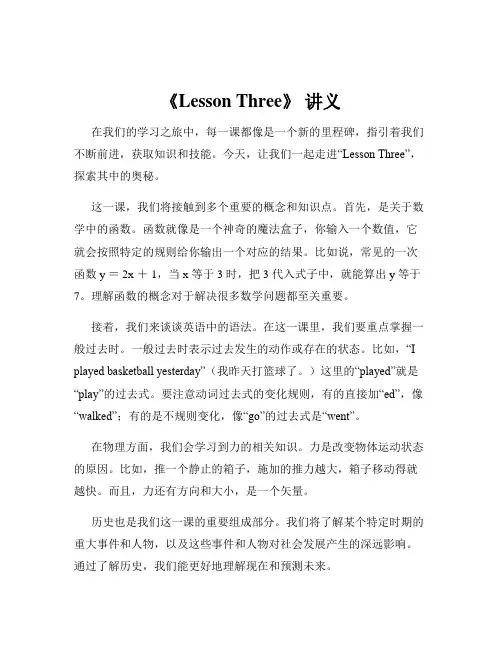
《Lesson Three》讲义在我们的学习之旅中,每一课都像是一个新的里程碑,指引着我们不断前进,获取知识和技能。
今天,让我们一起走进“Lesson Three”,探索其中的奥秘。
这一课,我们将接触到多个重要的概念和知识点。
首先,是关于数学中的函数。
函数就像是一个神奇的魔法盒子,你输入一个数值,它就会按照特定的规则给你输出一个对应的结果。
比如说,常见的一次函数 y = 2x + 1,当 x 等于 3 时,把 3 代入式子中,就能算出 y 等于7。
理解函数的概念对于解决很多数学问题都至关重要。
接着,我们来谈谈英语中的语法。
在这一课里,我们要重点掌握一般过去时。
一般过去时表示过去发生的动作或存在的状态。
比如,“I played basketball yesterday”(我昨天打篮球了。
)这里的“played”就是“play”的过去式。
要注意动词过去式的变化规则,有的直接加“ed”,像“walked”;有的是不规则变化,像“go”的过去式是“went”。
在物理方面,我们会学习到力的相关知识。
力是改变物体运动状态的原因。
比如,推一个静止的箱子,施加的推力越大,箱子移动得就越快。
而且,力还有方向和大小,是一个矢量。
历史也是我们这一课的重要组成部分。
我们将了解某个特定时期的重大事件和人物,以及这些事件和人物对社会发展产生的深远影响。
通过了解历史,我们能更好地理解现在和预测未来。
那么,如何才能学好这一课的内容呢?首先,要做好预习。
在上课前,先大致浏览一下教材,了解将要学习的主要内容,这样在课堂上就能更有针对性地听讲。
其次,课堂上要认真听讲,积极参与互动。
遇到不懂的问题,及时向老师提问。
课后,一定要多做练习题来巩固所学的知识。
可以通过做一些相关的习题集,或者自己总结知识点,然后出题给自己做。
同时,学习小组也是一个很好的方式。
和同学们一起讨论问题,互相交流学习心得,能够加深对知识的理解。
还可以利用一些在线学习资源,比如教学视频、学习网站等,来拓宽自己的知识面。
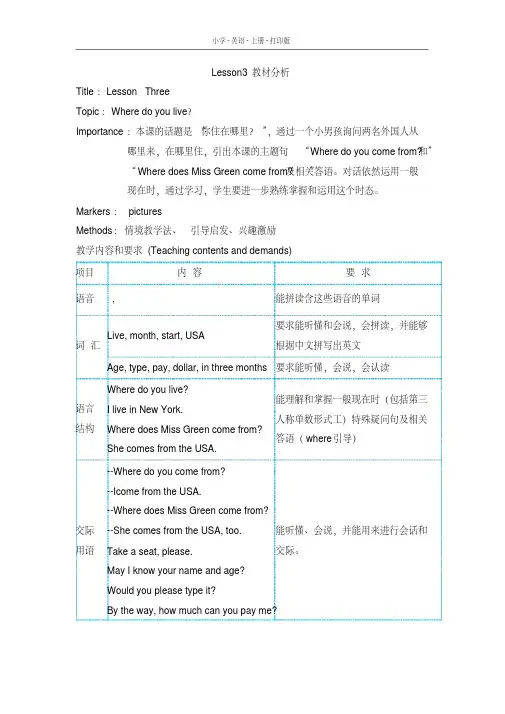
Lesson3 教材分析Title:Lesson ThreeTopic:Where do you live?Importance:本课的话题是“你住在哪里?”,通过一个小男孩询问两名外国人从哪里来,在哪里住,引出本课的主题句“Where do you come from?”和“Where does Miss Green come from?”及相关答语。
对话依然运用一般现在时,通过学习,学生要进一步熟练掌握和运用这个时态。
Markers:picturesMethods:情境教学法、引导启发、兴趣激励教学内容和要求(Teaching contents and demands)项目内容要求语音, 能拼读含这些语音的单词词汇Live, month, start, USA要求能听懂和会说,会拼读,并能够根据中文拼写出英文Age, type, pay, dollar, in three months 要求能听懂,会说,会认读语言结构Where do you live?I live in New York.Where does Miss Green come from?She comes from the USA.能理解和掌握一般现在时(包括第三人称单数形式工)特殊疑问句及相关答语(where引导)交际用语--Where do you come from?--Icome from the USA.--Where does Miss Green come from?--She comes from the USA, too.Take a seat, please.May I know your name and age?Would you please type it?By the way, how much can you pay me?能听懂、会说,并能用来进行会话和交际。
阅读Looking for a job. 能理解故事大意,并能回答与课文内容相关的问题或能根据图片及关键词进行复述。
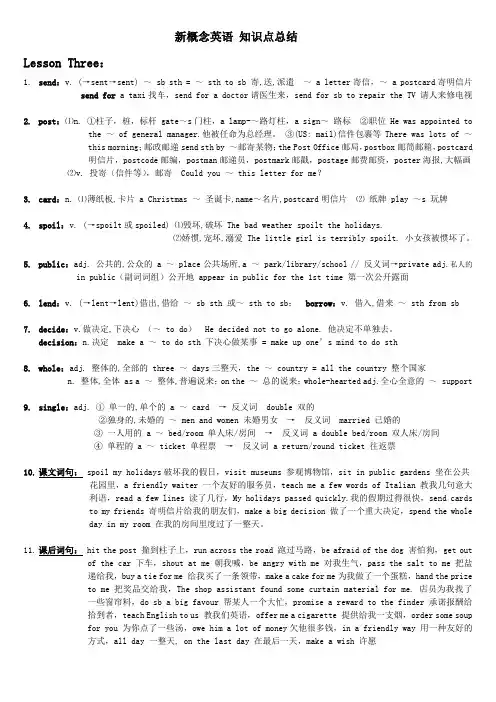
新概念英语知识点总结Lesson Three:1.send:v. (→sent→sent) ~ sb sth = ~ sth to sb 寄,送,派遣~ a letter寄信,~ a postcard寄明信片send for a taxi找车,send for a doctor请医生来,send for sb to repair the TV 请人来修电视2.post:⑴n. ①柱子,桩,标杆 gate~s门柱,a lamp-~路灯柱,a sign~路标②职位 He was appointed tothe ~ of general manager.他被任命为总经理。
③(US: mail)信件包裹等There was lots of ~this morning;邮政邮递send sth by ~邮寄某物;the Post Office邮局,postbox邮筒邮箱,postcard明信片,postcode邮编,postman邮递员,postmark邮戳,postage邮费邮资,poster海报,大幅画⑵v. 投寄(信件等),邮寄 Could you ~ this letter for me?3.card:n. ⑴薄纸板,卡片a Christmas ~圣诞卡,name~名片,postcard明信片⑵纸牌 play ~s 玩牌4.spoil:v. (→spoilt或spoiled) ⑴毁坏,破坏 The bad weather spoilt the holidays.⑵娇惯,宠坏,溺爱 The little girl is terribly spoilt. 小女孩被惯坏了。
5.public:adj. 公共的,公众的 a ~ place公共场所,a ~ park/library/school // 反义词→private adj.私人的in public(副词词组)公开地 appear in public for the 1st time 第一次公开露面6.lend:v. (→lent→lent)借出,借给~ sb sth 或~ sth to sb;borrow:v. 借入,借来~ sth from sb7.decide:v.做决定,下决心(~ to do) He decided not to go alone. 他决定不单独去。
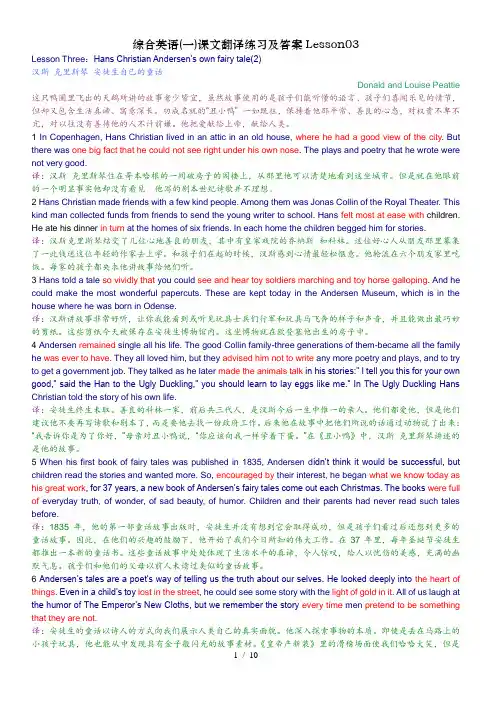
Lesson Three:Hans Christian Andersen’s own fairy tale(2)汉斯克里斯琴安徒生自已的童话Donald and Louise Peattie 这只鸭圈里飞出的天鹅所讲的故事老少皆宜,虽然故事使用的是孩子们能听懂的语言、孩子们喜闻乐见的情节,但却又包含生活真谛、寓意深长。
功成名就的“丑小鸭” 一如既往,保持着他那平常、善良的心态,对权贵不卑不亢,对以往没有善待他的人不计前嫌。
他把爱献给上帝,献给人类。
1 In Copenhagen, Hans Christian lived in an attic in an old house, where he had a good view of the city. But there was one big fact that he could not see right under his own nose. The plays and poetry that he wrote were not very good.译:汉斯克里斯琴住在哥本哈根的一间破房子的阁楼上,从那里他可以清楚地看到这坐城市。
但是就在他眼前的一个明显事实他却没有看见他写的剧本世纪诗歌并不理想。
2 Hans Christian made friends with a few kind people. Among them was Jonas Collin of the Royal Theater. This kind man collected funds from friends to send the young writer to school. Hans felt most at ease with children. He ate his dinner in turn at the homes of six friends. In each home the children begged him for stories.译:汉斯克里斯琴结交了几位心地善良的朋友,其中有皇家戏院的乔纳斯和科林。
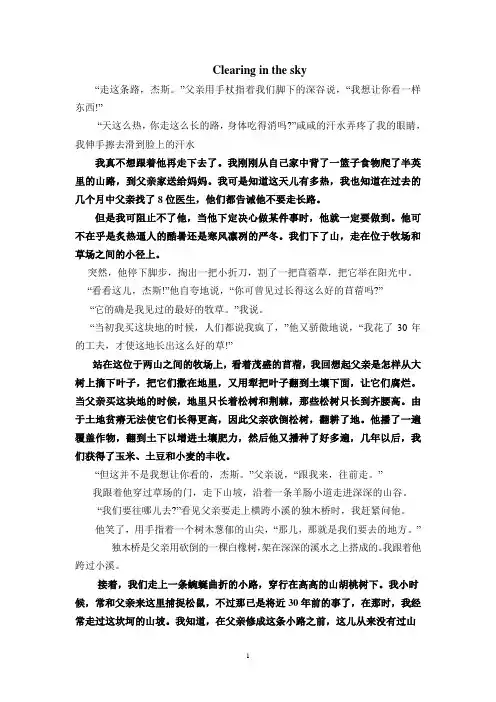
Clearing in the sky“走这条路,杰斯。
”父亲用手杖指着我们脚下的深谷说,“我想让你看一样东西!”“天这么热,你走这么长的路,身体吃得消吗?”咸咸的汗水弄疼了我的眼睛,我伸手擦去滑到脸上的汗水我真不想跟着他再走下去了。
我刚刚从自己家中背了一篮子食物爬了半英里的山路,到父亲家送给妈妈。
我可是知道这天儿有多热,我也知道在过去的几个月中父亲找了8位医生,他们都告诫他不要走长路。
但是我可阻止不了他,当他下定决心做某件事时,他就一定要做到。
他可不在乎是炙热逼人的酷暑还是寒风凛冽的严冬。
我们下了山,走在位于牧场和草场之间的小径上。
突然,他停下脚步,掏出一把小折刀,割了一把苜蓿草,把它举在阳光中。
“看看这儿,杰斯!”他自夸地说,“你可曾见过长得这么好的苜蓿吗?”“它的确是我见过的最好的牧草。
”我说。
“当初我买这块地的时候,人们都说我疯了,”他又骄傲地说,“我花了30年的工夫,才使这地长出这么好的草!”站在这位于两山之间的牧场上,看着茂盛的苜蓿,我回想起父亲是怎样从大树上摘下叶子,把它们撒在地里,又用犁把叶子翻到土壤下面,让它们腐烂。
当父亲买这块地的时候,地里只长着松树和荆棘,那些松树只长到齐腰高。
由于土地贫瘠无法使它们长得更高,因此父亲砍倒松树,翻耕了地。
他播了一遍覆盖作物,翻到土下以增进土壤肥力,然后他又播种了好多遍,几年以后,我们获得了玉米、土豆和小麦的丰收。
“但这并不是我想让你看的,杰斯。
”父亲说,“跟我来,往前走。
”我跟着他穿过草场的门,走下山坡,沿着一条羊肠小道走进深深的山谷。
“我们要往哪儿去?”看见父亲要走上横跨小溪的独木桥时,我赶紧问他。
他笑了,用手指着一个树木葱郁的山尖,“那儿,那就是我们要去的地方。
”独木桥是父亲用砍倒的一棵白橡树,架在深深的溪水之上搭成的。
我跟着他跨过小溪。
接着,我们走上一条蜿蜒曲折的小路,穿行在高高的山胡桃树下。
我小时候,常和父亲来这里捕捉松鼠,不过那已是将近30年前的事了,在那时,我经常走过这坎坷的山坡。
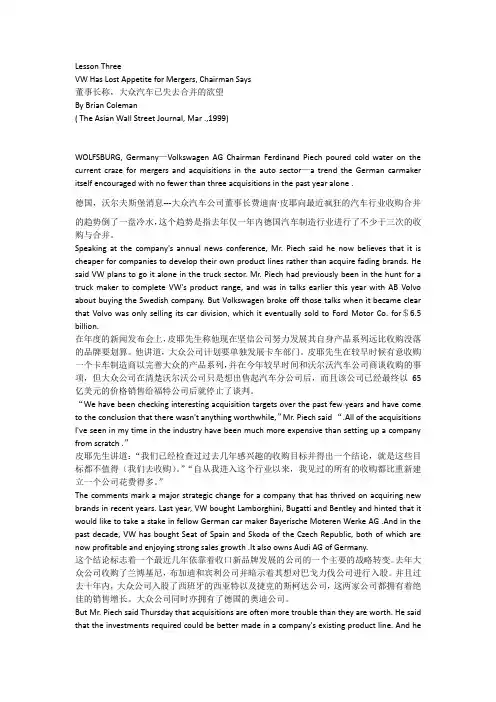
Lesson ThreeVW Has Lost Appetite for Mergers, Chairman Says董事长称,大众汽车已失去合并的欲望By Brian Coleman( The Asian Wall Street Journal, Mar .,1999)WOLFSBURG, Germany—Volkswagen AG Chairman Ferdinand Piech poured cold water on the current craze for mergers and acquisitions in the auto sector—a trend the German carmaker itself encouraged with no fewer than three acquisitions in the past year alone .德国,沃尔夫斯堡消息---大众汽车公司董事长费迪南·皮耶向最近疯狂的汽车行业收购合并的趋势倒了一盘冷水,这个趋势是指去年仅一年内德国汽车制造行业进行了不少于三次的收购与合并。
Speaking at the company's annual news conference, Mr. Piech said he now believes that it is cheaper for companies to develop their own product lines rather than acquire fading brands. He said VW plans to go it alone in the truck sector. Mr. Piech had previously been in the hunt for a truck maker to complete VW's product range, and was in talks earlier this year with AB Volvo about buying the Swedish company. But Volkswagen broke off those talks when it became clear that Volvo was only selling its car division, which it eventually sold to Ford Motor Co. for$6.5 billion.在年度的新闻发布会上,皮耶先生称他现在坚信公司努力发展其自身产品系列远比收购没落的品牌要划算。
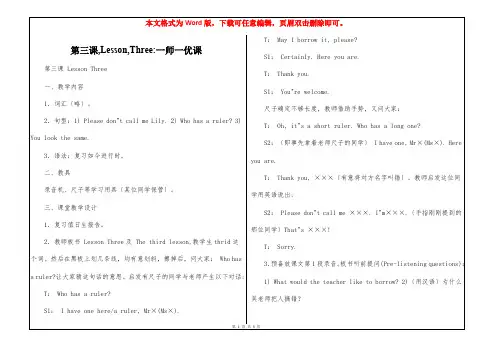
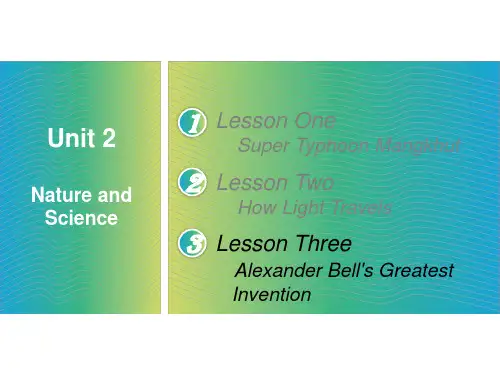
小学英语新课程标准教材英语教案( 2019 — 2020学年度第二学期 )学校:年级:任课教师:英语教案 / 小学英语 / 小学二年级英语教案编订:XX文讯教育机构第三课 Lesson Three教材简介:本教材主要用途为通过学习英语的内容,提高学生的语言技能,增加一项语言能力,有利于国际化的日常交流、生活、工作等,本教学设计资料适用于小学二年级英语科目, 学习后学生能得到全面的发展和提高。
本内容是按照教材的内容进行的编写,可以放心修改调整或直接进行教学使用。
一、教学内容1.词汇(略)。
2.句型:1) Please don't call me Lily. 2) Who has a ruler? 3) You look the same.3.语法:复习现在进行时。
二、教具录音机、尺子等学习用具(某位同学保管)。
三、课堂教学设计1.复习值日生报告。
2.教师板书 Lesson Three及 The third lesson,教学生thrid这个词。
然后在黑板上划几条线,均故意划斜,擦掉后,问大家: Who has a ruler?让大家猜这句话的意思。
启发有尺子的同学与老师产生以下对话:T: Who has a ruler?S1: I have one here/a ruler, Mr×(Ms×).T: May I borrow it, please?S1: Certainly. Here you are.T: Thank you.S1: You're welcome.尺子肯定不够长度,教师借助手势,又问大家:T: Oh, it's a short ruler. Who has a long one?S2:(即事先拿着老师尺子的同学) I have one, Mr×(Ms×). Here you are.T: Thank you, ×××(故意将对方名字叫错)。
Lesson three (第三课) 编写:LiciaIntroductions(介绍)一:个人概况about oneself对话范例:DialogHello, may I have you name? 你好,你叫什么名字?My name is Alexander; you can call me Alex for short. 我叫亚历山大,你可以简称我亚历克斯。
May I be so bold as to ask how old you are? 我可以冒昧的问一下你的年龄吗?I am twenty-two. 我22岁了。
You look younger than your age. Where are you from? 你看上去比实际年龄小,你来自哪里?I am from Canada. 我来自加拿大。
Really? So am I. where is you hometown? 真的吗?我也是,你的家乡是哪?I was born in a little town not far from Vancouver. 离温哥华不远的一个小镇。
I see. How many people are there in your family? 这样啊?你家里有多少成员?There are four, including me. 包括我在内有4个人。
Do you have any brother or sister? 有兄弟姐妹吗?I have a little sister. 我有一个妹妹。
老外习惯这样说:My grandfather lived to be eighty. 我的祖父活到80岁。
Could you please spell your name for me? 告诉我你的名字怎么拼,好吗?I was born in Beijing, but now I am an American citizen. 我生于北京,但现在我是个美国公民。
You have a little bit of a Northern accent. 你说话时带一些北方口音。
He looks so familiar, but I can’t remember his name. 他看起来很面熟,不过我想不起来他的名字了。
I wouldn’t like to talk about my age. 我不想谈论我的年龄。
I’ve left my hometown for several years. 我离开家乡好几年了。
Would you please tell me your address? 能告诉我你的地址吗?I have always been happy-go-lucky. 我通常是个乐天派。
I dreamed of buying a little cottage in the country. 我梦想着能在乡下买一栋小别墅。
Are your grandparents still alive? 你的祖父母还在世吗?My grandpa passed away last year. 我的祖父去年去世了。
I am fortunate enough to have my mother as a friend. 我很幸运,有一个朋友一样的妈妈。
The man who is riding is my elder brother. 正在骑马的男人是我哥哥。
Tell me something about your wife. 谈谈你妻子吧。
She is a good wife and devoted mother. 她是个贤妻良母。
He seems a little homesick. 他看起来有点想家。
常规用法误区:I haven’t English name.I don’t have an English name.I am 30 when this year passed.I’ll be 30 later this year.What’s your job?Are you working at this moment?I am the smallest child in my family.I am the youngest child in my family.I know his face.I know him by sight.常用词汇:First name: 名字Family name : 姓氏Nationality: 国籍Province: 省City: 城市Village: 村庄Capital: 首都Hometown: 家乡Grandfather: 祖父Grandmother: 祖母Uncle: 叔叔,伯父,舅父,姑父Aunt: 婶母,伯母,舅母,姑母Nephew: 侄子,外孙Niece: 侄女,外孙女二,工作Job对话范例:DialogHello, Jack. What happened? You look very upset.I am in good shape, but my job is not very good.What’s bothering you?I mad a mistake and then tried to cover it, but I failed, and my boss found it.It’s a pain in the neck, why don’t you just own up and tell someone?I was too scared that I would be fired. You know that I really like this job.But you know, when you have made a mistake, it is important to tell someone so that it can be fixed.I wished I had heard what you said earlier. I think I will do better next time.You won’t do that again. You’re not a fool, and only fools make the same mistake twice.As always you are the bright one with the good advice.But remember, even the brightest person makes mistakes sometimes.I got it.And what will you do to correct your mistake?I don’t know, I have no other choice.Don’t just shake your head; you’ve got to do something.I will do. I will give you my word.老外习惯用语Sorry to bother you.What’s the rush?I couldn’t agree more.Let’s forgive and forget.I hope it turns out all right.How long will it take to have this TV fixed?You face tells it all.I hope this will teach you a lesson.You’ve got to do something.It’s a hard job, but I hope he can make it. Something’s come up.Let’s get to the point.Keep that in mind.I’m behind in my work.We’re in the same boat.I’m fed up with my boss.The computer doesn’t work.You can count on us.I will play it by ear.常规用法误区:Where is your address?Would you please tell me your address?I think I can’t help you.I don’t think I can help you.Would you like to join our party on Sunday night? Would you like to come to our party on Sunday night? What time is it now?What time is it, please?常用词汇:Full-time: 全部时间的,专任的Part-time: 兼职的,部分时间的White-collar: 白领阶层的Blue-collar: 蓝领阶层的Freelancer: 自由职业者Income: 收入,所得Earning: 赚取的钱,收入Well-fare: 福利,社会保障Routine: 例行公事Negotiate: 谈判Profit: 利润。